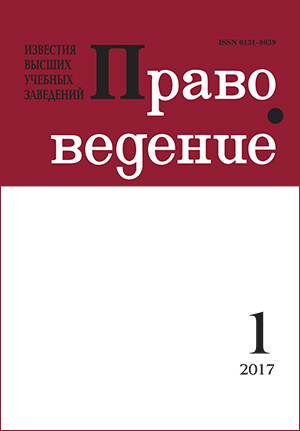Philosophy of law in the era post-metaphysics
Abstract
The author analyzes the state of the modern philosophy which can be called post-metaphysical. This is a new type of rationality, a situational intelligence, a linguistic turn and a primacy of everyday life. The crisis of the modern philosophy is determined by recognition of limitations of a human mind and by refusal from meta-narratives. The result is a postclassical type of rationality, a new version of the philosophical discourse and the philosophy of law. The post-classical philosophy recognizes the potential inexhaustibility, the lack of a single referent in any complicated social phenomenon or process, including the law. The post-classical philosophy of law sets a new view on the law. Naive objectivism of the law is replaced by intersubjectivity; absence of a subject within the legal normativity is transformed into the anthropocentrism; contextualism or relativity of the law replace universalism; constructed character of the legal reality replaces the static nature of the law. All potentially inexhaustible modes of the law existence have an inner basis, that is a legal communication the content of which is a dialogue. The post-classical social philosophy creates the following image of the legal reality: 1) the law is created (constructed) by human beings; 2) the law is determined by the historical, as well as the social and cultural context; 3) the law is a multifaceted phenomenon, potentially inexhaustible in its external manifestations. The “humanity”, symbolic meaning and practical orientation are the main modes of the law existence, in terms of the post-metaphysical thinking. The analysis of the metaphysics and mythologies of the law, statute and power performed by I. A. Isaev is one of the original projects of the post-classical philosophy of law. He argues that the modernity as total rationality is one of the myths of the Western classical philosophy. The irrational is an inherent aspect of the legal reality. A myth, in his opinion, has always accompanied a person. The myth penetrates all social, political, and legal constructions, the ideals and utopia of the human being. The role of the philosophy of law in the postmetaphysical era is not only in the analysis of the irrational side of the law. The philosophy of law is a “top” level of jurisprudence that sets the ways of ontological, epistemological and axiological justification of the law. The philosophy of law sets the scientific heuristics, formulates the most abstract legal concepts, forms legal image of the world, and defines the subject of jurisprudence and its methodology. At the same time, the philosophy of law develops the criteria of a scientific character of the legal knowledge and assessment of the practices.
Keywords:
post-classical philosophy, post-metaphysical thinking, philosophy of law, function of the philosophy of law, metaphysics, metaphysics of the law, legal reality
Downloads
References
Downloads
Published
How to Cite
Issue
Section
License
Articles of "Pravovedenie" are open access distributed under the terms of the License Agreement with Saint Petersburg State University, which permits to the authors unrestricted distribution and self-archiving free of charge.




